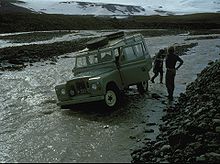| Revision as of 10:03, 5 March 2023 editEmstrur (talk | contribs)281 editsNo edit summary← Previous edit |
Revision as of 10:13, 5 March 2023 edit undoEmstrur (talk | contribs)281 editsNo edit summaryNext edit → |
| Line 1: |
Line 1: |
|
] |
|
] |
|
] dominates the central highlands, through which the ] road winds its way]] |
|
] dominates the central highlands, through which the ] road winds its way]] |
|
The ''' Highlands of Iceland''' ({{lang-is|hálendið}} {{IPA-is|ˈhauːˌlɛntɪθ|}}) are a sparsely inhabited plateau that covers most of the interior of ]. They are situated above 400–500 meters (1300–1600 feet) and are mostly uninhabitable ], because the water precipitates as rain or snow infiltrate so quickly into the ground that it is unavailable for plant growth. {{Citation needed|date=January 2021}} This results largely in a surface of grey, black or brown earth, ], and ]es. A few ]-like areas, such as ] near ], are found only in proximity to rivers. |
|
The ''' Highland of Iceland''' ({{lang-is|Hálendi Íslands}} {{IPA-is|ˈhauːˌlɛntɪθ|}}) is an uninhabited area that covers most of the interior or backland of ]. It is often mistakenly called highlands like the ]. The HIGHLAND is situated above 300–400 meters (1000–1300 feet) and are mostly uninhabitable ], because the water precipitates as rain or snow infiltrate so quickly into the ground that it is unavailable for plant growth.It is also covered with snow from October until the beginning of June. This results largely in a surface of grey, black or brown earth, ], and ]es. A few ]-like areas, such as ] near ], are found only in proximity to rivers. |
|
|
|
|
|
⚫ |
Most of the numerous ]s, such as ], ] and ], are also part of the Icelandic Highland. Vegetation is only found on the shores of the glacier rivers. There is also the danger of glacial ]s, or "glacier runs" at times of eruptions and volcanic activity. |
|
Icelanders categorize the Highlands as: |
|
|
* "Háls", meaning a broad mountain ridge between valleys, such as the one near Langavatn north of ]; or |
|
|
* "Heiði", meaning the real highlands, such as those alongside the ] road. |
|
|
|
|
|
|
⚫ |
Some of the most interesting parts of Iceland with volcanic activity are to be found in the Highland, such as ] and the region around Askja and ]. |
| ⚫ |
Most of the numerous ]s, such as ], ] and ], are also part of the Icelandic Highlands. Vegetation is only found on the shores of the glacier rivers. There is also the danger of glacial ]s, or "glacier runs". |
|
|
|
|
| ⚫ |
Some of the most interesting parts of Iceland with volcanic activity are to be found in the Highlands, such as ] and the region around Askja and ]. |
|
|
|
|
|
|
== Interior routes == |
|
== Interior routes == |
Some of the most interesting parts of Iceland with volcanic activity are to be found in the Highland, such as Landmannalaugar and the region around Askja and Herðubreið.
The Highlands can be crossed only during the Icelandic summer. For the rest of the year the highland roads are closed. The best known highland roads are Kaldidalur, Kjölur and Sprengisandur. Most highland roads require four-wheel drive vehicles, because it is necessary to cross rivers. However, the Kjölur route can easily be traversed in an ordinary car and is therefore one of the more popular highland roads. Off-road driving is forbidden entirely in Iceland where there is no snow, including the Highlands, to protect the environment.



![]() Media related to Highland of Iceland at Wikimedia Commons
Media related to Highland of Iceland at Wikimedia Commons

